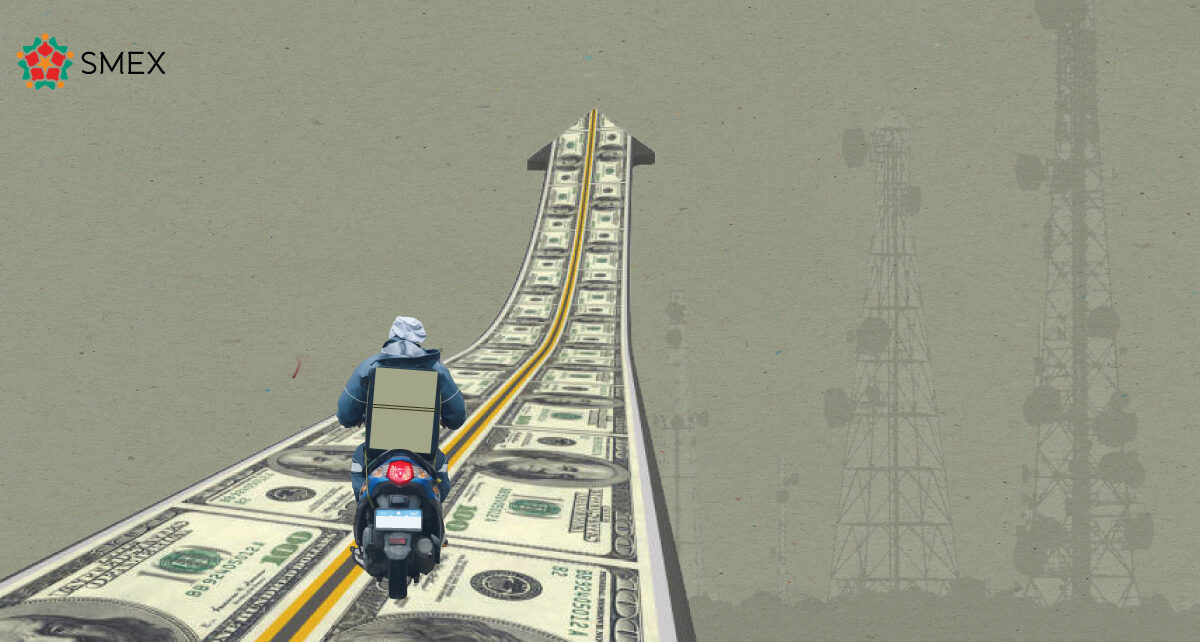“Working in this field has become more difficult. We work 12 hours per day in exchange for a meager salary that barely covers our daily needs…not to mention the dangers of working as drivers late at night, with all the thefts happening.”
Abdallah, who works in delivery, now has to shoulder more burdens. This is the case for many drivers who rely on apps to provide delivery and transportation services. The recent five-fold increase in internet prices has become a huge concern for delivery workers who fear losing their jobs for lack of connectivity.
“The internet tariffs have increased and so have our problems,” a driver who works with Bolt, a transportation service that links drivers to riders through a mobile app, told SMEX. “In Lebanon, our salaries cannot buy us our basic needs,” he added.
On July 1st, the Ministry of Telecommunications first implemented the decision to raise telecom and internet prices to “Sayrafa” rates, established by the Central Bank (BDL). The logic behind this is to provide an exchange rate of the Lebanese Lira to the dollar that is lower than the black market’s rate, and higher than the outdated, official one.
This measure was hastily taken without any comprehensive survey of jobs across the public sector, workers’ salaries and purchase power, a review of the conditions of employment, or a plan for improving wages.
The official exchange rate is still at LBP 1,500 to the dollar, while the “Sayrafa” rate is currently set at LBP 29,800. The dollar on the black market, however, has exceeded LBP 38,000. Despite the deterioration of the local currency, the persistence of sharp fluctuations in the exchange rates, inflation rates exceeding 200%, and economic stagnation for four consecutive years, the telecommunications and internet sector is still considered the main operator of public transport and delivery services, and other sectors and jobs for people with limited income.
In light of the almost four-fold increase in tariffs since July, a considerable number of people in Lebanon have had to purchase limited internet packages only. Others could no longer afford subscribing to internet services at all. If we look at the current prices, we can see how someone who used to pay LBP 150,000 for 30 gigabytes of internet is now paying 15 dollars, or around LBP 570,000.
The dollar fluctuation period is a difficult period for drivers whose work is dependent on both the internet and telecommunications networks. Abdel Hadi, a motorcycle driver working with the delivery company “Bolt,” told SMEX that, “Drivers are suffering because of the constant increase of the dollar’s exchange rate on the platform, and sometimes if the network is weak, our work becomes very slow.”
The repercussions of the service interruption extend to the financial sector, bank branches, and state institutions. It also affects businesses that are not directly related to media or administrative work, such as transportation and others, which are mostly based on free telecommunications and applications.
In this regard, the work of some transport workers and small merchants may be disrupted due to the interruption of the internet service, because as they say, “there will be no delivery requests without a phone service.”
No Going Back on the Decision to Increase the Tariffs
The Minister of Telecommunications, Johnny Corm stated that “The ministry cannot consider exceptions to these decisions; if we were to, 80% of the Lebanese population would be concerned.”
Lebanon is able to keep up with the digital revolution that the world is witnessing; however, the difficult circumstances coupled with the economic challenges facing the country locally and internationally stand in the way of keeping up the pace of progress.
Electronic platforms used by companies that hire drivers, such as “Toters” and “Bolt” need a strong, reliable internet network to conduct their businesses. Nevertheless, telecommunications and internet services were interrupted at the beginning of September when “Ogero” workers began a strike that lasted approximately three weeks, paralyzing all jobs that are closely linked to this sector.
Because telecommunications and internet services are increasingly linked to other sectors such as health, education, and public services, we can easily anticipate the extent of the damage that could occur as a result of mismanaging the sector.
Yet, Minister Corm, is adamant on keeping the internet unaffordable for most, stating that: “There is no going back on the decision for now.” According to Corm, the increase in tariffs aims to “ensure the continuity of the telecommunications and internet services in Lebanon and not securing more money for the public treasury.” He said that the main problem lies in the shortage of diesel necessary to run the official electric power plants. As such, the telecom sector needs to cover expenses for standby generators to sustain each of its centers across Lebanon.
What About Other Options?
Contrary to what the minister said, communications expert and former general manager of “Touch” company, Wassim Mansour, confirmed to SMEX that “the goal of increasing the tariffs of mobile services is not related to the purchasing power of consumers nor the continuity of providing services, but rather to increasing the treasury’s revenues.”
Mansour also pointed out that “prices are only raised directly in very few cases, most notably the excessive inflation of the state’s economy, through the amendment of a tariff decree, regardless of whether the sector is owned by the state or by private companies.”
According to Mansour, there are several options that can be adopted other than increasing tariffs, regardless of market prices. For example, the ministry could adopt a “national roaming service” and a co-location system between the two mobile companies, which would reduce operating and maintenance costs and the need for fuel. He explained that “national roaming allows subscribers from both networks [Alfa and touch] to use the other network when the first network’s station is turned off.”
Governments find it easy to raise prices first, instead of looking into the sector’s numbers and making the required reforms and improvements. It’s clear that the sector needs more than just increasing tariffs, especially since before the financial and economic crisis and the collapse of the exchange rate, companies and the state did not invest in developing the sector as needed. Instead, a large part of the revenues was being lost to corruption.
The State Audit Bureau report on the telecommunications’ sector in Lebanon, issued in February of this year, shows a large percentage of waste on maintenance and operation, amounting to USD 6 billion during the 10 years between 2010 and 2020. The most prominent recommendations made by the State Audit Bureau with regard to the telecom sector can be summarized as such: “Adopting open, transparent and public tenders in all operational and capital expenditures, and presenting projects in advance to the State Audit Bureau,” as well as “reducing inflated and unnecessary expenses.”



